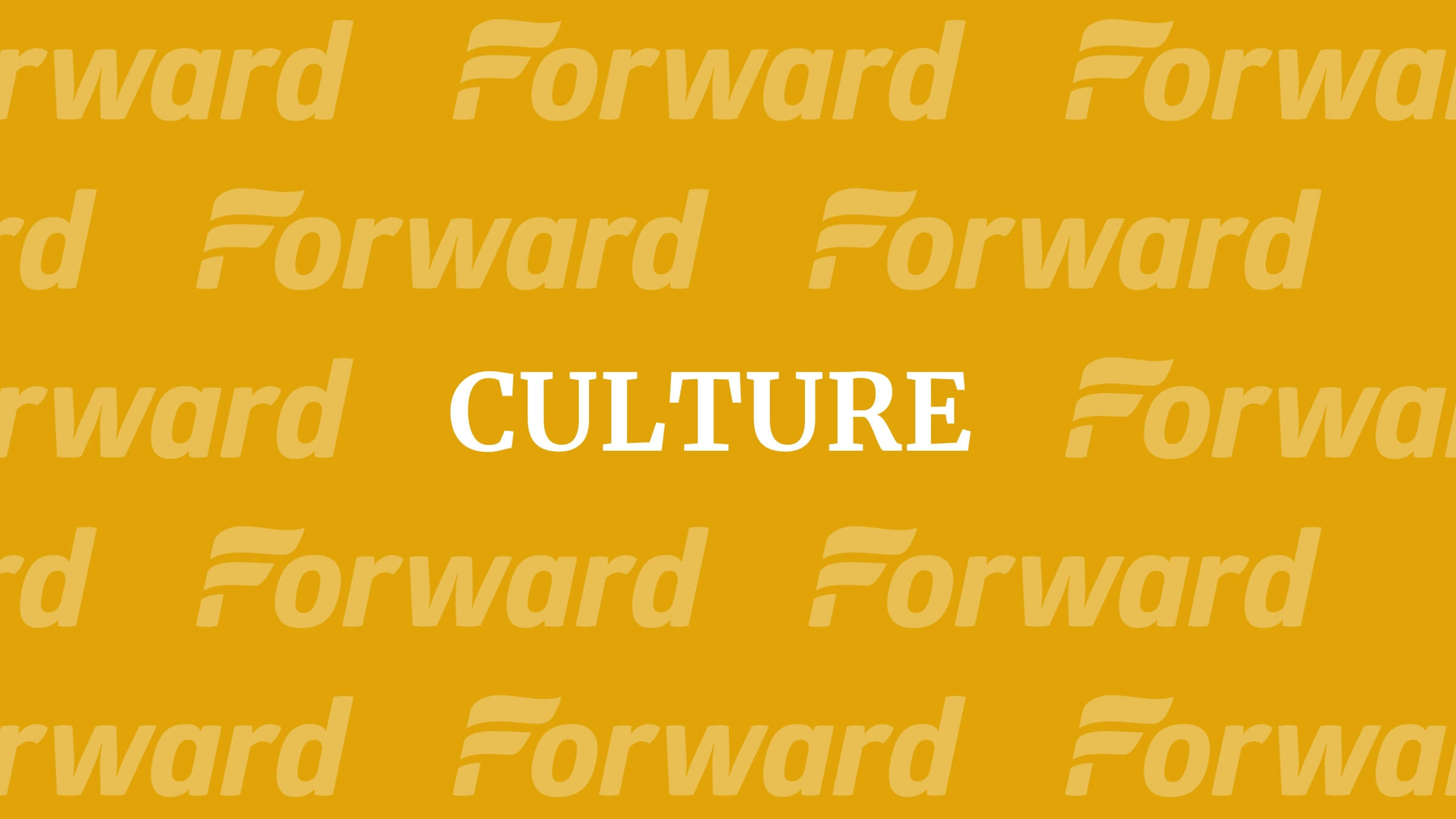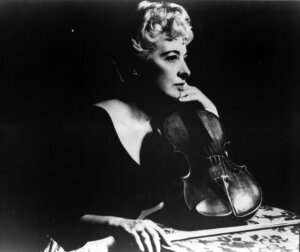The brilliant Jewish artist that time forgot
A pair of reissues is finally focusing attention on master violinist Eudice Shapiro

Graphic by Angelie Zaslavsky
The Jewish violinist Eudice Shapiro, who died in 2007 at age 93, proved that even with talent and charm, life as a woman and a musician in America could be as shaky as that of a fiddler on the roof.
Shapiro, who is being honored with two new CD reissue sets from Biddulph Recordings, was a virtuoso with superstar friends like the violinist Jascha Heifetz and cellist Gregor Piatigorsky. Yet her own celebrity was limited to a circle of mavens, in part because she spent years as concertmaster in Hollywood studio orchestras, sight reading new musical scores under pressure, but uncredited when the film credits rolled. Hidden from the public eye, she became the first-ever female concertmaster hired by any Hollywood studio.
Other mighty talents among Jewish studio violinists were male: Toscha Seidel, Felix Slatkin, Israel Baker and Louis Kaufman. Shapiro chose the concertmaster path because although Jewish male violinists achieved stellar careers, few Jewish women fiddlers were popular. The exceptions, Austria’s Erika Morini, Hungary’s Ilona Fehér, and Poland’s Ida Haendel, were foreign-born.
After being the sole female student in the class of the Russian Jewish instructor Efrem Zimbalist at the Curtis Institute of Music in Philadelphia, where she toiled alongside such Jewish friends as Oscar Shumsky and Felix Slatkin, Shapiro headed west to seek year-round employment, at a time when most musicians were limited to abbreviated seasonal engagements.
Shapiro was born in Buffalo; her maternal grandfather emigrated from Riga, Latvia, to be a cantor at a local synagogue. As a youngster, she thrilled to a 1926 sound film featuring the Russian Jewish fiddler Mischa Elman. She also attended live performances by Austrian Jewish string legend Fritz Kreisler, who, Shapiro commented, was a “sweet old man” like her grandfather.
Her way of adopting fellow Jewish musicians into an endearing mishpacha was doubtless part of the reason why so many wished to collaborate with her onstage, including the pianists Artur Schnabel, from Austria; Lili Kraus, from Hungary; and Bruno Walter, from Germany.

Another ally for Shapiro was the Polish Jewish composer Victor Young, whose schmaltzy melodies like “Je Vous Adore” express quasi-liturgical Yiddishkeit. The hyperactive Young created soundtracks for the films For Whom the Bell Tolls and Around the World in 80 Days; Shapiro performed that music as well.
Arthur Rubinstein would be another West Coast wartime pal. Shapiro and her husband, cellist Victor Gottlieb, would find a stable paycheck from the film industry, although in 1955 their progress was hampered by the Hollywood blacklist, a result of McCarthyism.
As witnesses before the House Committee on Un-American Activities (HUAC), Shapiro and Gottlieb refused to inform on their musician friends. They were fired by Paramount Studios, even though their presence was invisible to the public and their contributions unbilled.
An effervescent personality, Shapiro had hosted parties for musician friends, some of them left-wing, but as the pianist Yaltah Menuhin personally informed J. Edgar Hoover, Shapiro and Gottlieb were “civil libertarians,” but by no means communists.
Cultural historian Val Holley observes that Mike Connolly, a West Coast gossip columnist, gloated over Shapiro and Gottlieb being fired “for taking the Fifth” and wondered if there might be some connection with the news that Mike Todd, producer of Around the World in 80 Days, was supposedly negotiating a “production deal with the Soviets.” The fiery Todd, born Avrom Hirsch Goldbogen, took out large advertisements in entertainment industry periodicals to affirm that there was in fact no connection.
This episode weighed heavily on Shapiro, and a few years later, Gottlieb would die of a heart attack. Shapiro spoke little of these years later, even to friends. A HUAC transcript plainly states that Shapiro testified before the committee, but in a reminiscence, the author Sasha Abramsky, a family friend, claimed that Shapiro “had not been called before HUAC.”
Yaltah Menuhin’s son Lionel Rolfe set the record straight by explaining: “Eudice Shapiro, a top-rate first violinist for Paramount, lost her job not because she was a communist but because she refused to name names. Her husband Victor Gottlieb, also first cellist in the Paramount orchestra, lost his job for the same reason. Victor died of a heart attack not much later — and Eudice had a hard time surviving.”
This despite a widely recognized talent for playing venerable classics, like a deftly manic rendition of Felix Mendelssohn’s “String Quartet in E minor,” as well as new music. She vigorously championed contemporary composers, including music by West Coast Jewish friends.
Shapiro and Gottlieb appeared in the 1955 documentary A Visit With Darius Milhaud, an homage to the French Jewish composer. Earlier, at a typical recital programme in 1947 at Washington’s National Gallery of Art, Shapiro interpreted other works by Milhaud, as well as “Three Preludes,” by Frederick Jacobi and the “Suite for Violin and Piano, Based on American Folk Tunes,” by Alan Shulman, a musician of Russian Jewish origin.
Some of the Jewish composers she promoted achieved a measure of renown. Shapiro and her ensemble, the American Art String Quartet, kvelled in the brilliant dynamism of Lukas Foss’ “String Quartet No. 1.” Foss, born in Berlin as Lukas Fuchs, arrived in the late 1930s as a wartime refugee in America, where he would attain distinction as a pianist and conductor as well as composer.
The fiercely lucid American Jewish musician Leon Kirchner’s “String Quartet No. 1” was another high point, as was the Austrian Jewish Ernst Toch’s “Violin Sonata,” played with straightforward limpidity and unpretentiousness.
Other composers performed by Shapiro are still awaiting the attention they deserve; Ellis Kohs, born in Chicago of Russian Jewish origin, wrote “A Short Concert for String Quartet,”delivered with Coplandesque open-hearted honesty. Indeed, Shapiro was also a well-known performer of works by the most celebrated American Jewish composer, Aaron Copland.
Fans followed Shapiro’s trajectory, and the young Susan Sontag noted in an early diary about a West Coast pilgrimage where she attended a concert by Eudice Shapiro and her American Art Quartet. Yet the strain of simultaneously playing modern music and popular works took its toll on some of Shapiro’s friends. Felix Slatkin died from a heart attack at age 47.
Shapiro managed to live almost twice as long, despite an occasional penchant for martinis, in part due to the stability of a steady teaching job. In 1956, the Hungarian Jewish cellist Gábor Rejtő, offered her a permanent post at the University of Southern California.
There she remained for over a half-century, honored by her pupils. One among them, the American Jewish violin soloist Glenn Dicterow, recalled that Shapiro was an “extremely nurturing, very regal human being” known to students as “Mother Shapiro.”
In old age, Eudice Shapiro still exuded magisterial calm and balance, which must have been especially welcome in a world of Jewish male divas performing on an innately hysterical instrument, the emotivity of which tantalizes the nerves, usually somewhere between a sob and a schrei.
















